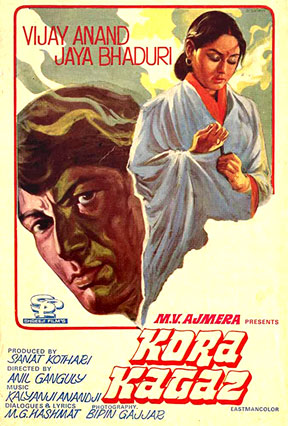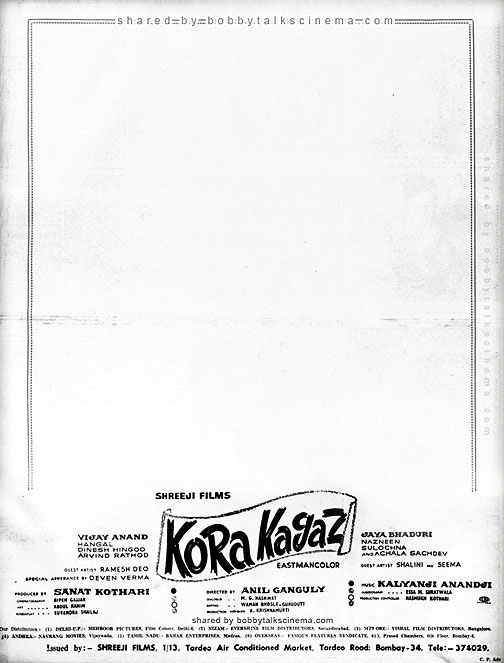
An emotional family drama revolving around a couple in love and their differences post marriage (caused by the girl’s interfering mother), KORA KAGAZ is directed by Anil Ganguly, featuring Vijay Anand, Jaya Bhaduri, Achala Sachdev, A.K. Hangal and Deven Varma playing the key roles.
A remake of Ajoy Kar’s Bengali film SAAT PAAKE BANDHA (Tied By Seven Steps/1963) starring Soumitra Chatterjee, Suchitra Sen, Pahari Sanyal and Tarun Kumar, the original was adapted in couple of other Indian languages too. But it was all actually based on the Bengali story ‘Saat Paake Bandha’ by Ashutosh Mukhopadhyay.
As an adaptation or remake, KORA KAGAZ is a well-made film, more focusing on the character of Jaya as the suffering or victim daughter, getting appreciable support from the key artists along with Vijay Anand. However, cannot say whether Jaya realized it or not, but she had played a quite similar role just an year before in Rajinder Singh Bedi's PHAGUN, based on the director’s own story. Interestingly, in PHAGUN too, a substantial part of the story revolves around the couple (Jaya and Vijay Arora) getting disturbed by Jaya’s interfering mother (Waheeda Rehman) living along with them. For friends who haven’t seen the film, its storyline actually has a unique and rare angle of a mother’s strong affection towards her son-in-law.
Here would like to mention a nostalgic scene in PHAGUN, in which Jaya and her friend go to watch a For Adults Only film in the theater, where Jaya successfully manages to enter the hall fooling the ticket collector (despite looking too short and young). And the film playing on the screen happens to be DASTAK (1970), the first and an important thought-provoking film of writer-producer-director Rajinder Singh Bedi.
Moving ahead, narrating its plot of love, marriage and post marriage issues entirely in flashback, KORA KAGAZ ends on a positive note when Vijay and Jaya once again meet in a Railway Station’s waiting room after years of their separation. Sharing my personal opinion, this particular scene strongly reminded me of the basic premise of Gulzar’s IJAAZAT having an exactly similar scene and concept based on the story of Subodh Ghosh.
Elaborating further, where KORA KAGAZ begins with the story narrated through flashbacks, leading to the re-union of the couple in the Waiting room of a railway station. IJAAZAT begins from the re-union in the station’s waiting room and then moves back to the flashbacks narrating a distinctive story of the couple’s separation.
Moreover, I recently noticed a similar sequence in an episode of Anurag Basu’s TV/web series on the famous stories of Rabindranath Tagore, based on the complex CHOKHER BALI. In its concluding episode of the story too, the two leading characters once again meet in a waiting room of a railway station after a long time and then move on their individual paths never to meet again.
However a similar sequence isn’t there in Rituparno Ghosh’s adaptation of CHOKHER BALI (2003) in Bangla, featuring Aishwarya Rai in the lead. In fact that makes Tagore’s quote mentioned in the beginning of Ghosh’s film even more relevant, that says,
“Ever since ‘Chokher Bali’ was published, I have always regretted the ending. I ought to be censured for it.”
Coming back to KORA KAGAZ, I watched it in the ‘80s when re-runs of hit films with great songs was a norm in the single screen theaters in between the new releases. And there is no denying the fact, that even today KORA KAGAZ is more remembered for its three musical gems (Mera Jeevan Kora Kagaz, Mera Padhne Mein Nahin, Roothe Roothee Piya) so thoughtfully penned by the lesser discussed and celebrated M. G. Hashmat (who also wrote the dialogues) and superbly composed by Kalyanji Anandji.
For instance, you must have heard many famous songs with life teaching lyrics repeatedly mentioned in various articles, videos and TV/Radio programs. But rarely someone mentions these lines of M. G. Hashmat from the lesser heard version of the most famous song of the film, beautifully rendered by Kishore Kumar as:
“Dukh Ke Andar Sukh Ki Jyoti,
Dukh Hi Sukh Ka Gyan,
Dard Seh Ke Janam Leta,
Har Koi Insaan,
Wo Sukhi Hai, Jo Khushi Se Dard Seh Gaya,
Sukh Ka Sagar Uska Jeevan Ban Ke Reh Gaya”
KORA KAGAZ won wide appreciation on its release as family dramas were the in-trend themes in those times, both in films as well as in Hindi novels and magazines. The film also won two National Awards including theSpecial Award for feature film with Mass Appeal, Wholesome Entertainment and Aesthetic Value and Best Female Playback Singer awarded to Lata Mangeshkar for the song “Roothe Roothe Piya” in the 22nd National Film Awards in 1975.

Revealing the most interesting and exciting part of the write-up, if we consider the title
KORA KAGAZ, then it literally means
‘Blank Paper’. And while watching the film again in the last decade on a cable TV channel, I honestly thought that how innovative it would have been if only a blank page was advertised by the makers in the leading magazines at the time of its release, boldly representing the film's title.
To my surprise, though I was just wishing the makers to be that bold, the team actually was, and they did have the courage to go for exactly the same in the leading newspaper SCREEN announcing the beginning of their film.
Sharing the rare fact, the makers of KORA KAGAZ announced the project in January 1973, more than one year before its release, with one of the most courageous advertisements in SCREEN newsmagazine, having simply nothing on the entire page except the credits at the bottom representing the title meaning Blank Paper (as shared in the article).
Having worked in the field of designing especially related with the film artworks, believe me....
- firstly, it needs guts to innovatively think and design such creative for a film's first look poster.
- secondly, it needs bigger guts to accept it, appreciate it, approve it and pay for such minimal designing.
- and lastly, it truly needs the maximum courage to further get it published in the leading newsmagazine as the first look poster/announcement of the project, without showing anything at all defying the set rules of the trade.
No doubt, this can easily be included in the exclusive list of the most courageous and innovative print advertisements ever published in the history of Hindi films till date.
Summing up, it’s great if you have already seen all the films mentioned in the write-up. But in case you have missed a few then do give them a chance as they truly deserve both your time and effort introducing you to many blessed creators of our Hindi Cinema.
Cheers!
Bobby Sing (Harpreet)
All Rights Reserved – 21st May 2020 – bobbytalkscinema.com


 Revealing the most interesting and exciting part of the write-up, if we consider the title KORA KAGAZ, then it literally means ‘Blank Paper’. And while watching the film again in the last decade on a cable TV channel, I honestly thought that how innovative it would have been if only a blank page was advertised by the makers in the leading magazines at the time of its release, boldly representing the film's title.
Revealing the most interesting and exciting part of the write-up, if we consider the title KORA KAGAZ, then it literally means ‘Blank Paper’. And while watching the film again in the last decade on a cable TV channel, I honestly thought that how innovative it would have been if only a blank page was advertised by the makers in the leading magazines at the time of its release, boldly representing the film's title.